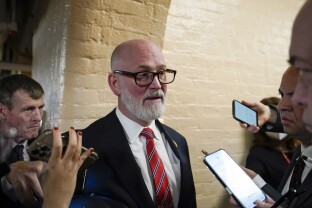Congressional Republicans’ newly passed reconciliation bill will undoubtedly have a huge effect on state budgets in the future, and in at least one instance, state lawmakers rushed to head off the impact of the legislation before it even passed.
Wisconsin state lawmakers and Democratic Gov. Tony Evers raced against the clock to pass a new budget in an all-nighter that stretched into the wee morning hours of Thursday, in an attempt to beat the House passage of the bill. It was a dramatic speed-up of a usually drawn-out process and a rare bipartisan agreement between a Democratic governor and a Republican legislature.
“They had to do it fast. I mean, it would have been a billion dollars lost to the state. It just shows how awful this bill was,” Democratic Rep. Mark Pocan told NOTUS.
The reason for the hurry was a specific provision of President Donald Trump’s signature policy bill involving the provider tax, or hospital assessment fee. Hospitals and other health care providers are charged a tax, which is matched by the federal government. That revenue is used to reimburse providers and also helps Wisconsin pay for BadgerCare Plus, one of the state’s Medicaid programs.
But as part of the congressional bill’s goal to save federal dollars to pay for tax cuts, the law caps how much states can get from the federal government. It does allow, however, states with provider tax rates of up to 6% to be grandfathered in.
Those provisions posed a major issue for Wisconsin, which hasn’t raised its provider tax since 2009. The state was set to forfeit over $1 billion in matching funds unless it was able to increase the tax. Evers and the state’s legislature managed to get that done, raising the rate from 1.7% to 6%.
“I can’t stress how incredibly thankful I am that we got this done, because it truly is gonna be a game changer,” Republican Rep. Derrick Van Orden told reporters shortly after the policy bill cleared its last congressional hurdle, final passage in the House.
Van Orden, who supported the bill, sent a letter to Evers urging him to sign the state budget to secure the matching funds.
“Delaying the state budget enactment beyond July 3rd risks losing vital opportunities for the state’s healthcare system and the Wisconsinites who rely on it. Healthcare and rural healthcare, in particular, is vital to us in Wisconsin,” Van Orden wrote in the letter. “We cannot leave anything on the table. Please act swiftly to sign the budget and secure the provider tax increase in time to meet this critical federal deadline.”
But Wisconsin’s congressional Democrats were unimpressed with his efforts, which they argued were hypocritical given his support of the legislation.
“It’s interesting that people who said there’s no Medicaid cuts, like Derrick Van Orden, sent a letter to the governor now, acknowledging that there’s a cut. So I think that was just a proof point that Derrick’s an idiot,” Pocan said.
Van Orden defended his support of the legislation to reporters on Thursday. He insisted that he wasn’t worried the bill would hurt the state, and Evers’ signing the budget meant “we’re gonna get an additional billion dollars a year for rural healthcare in the state of Wisconsin. That’s awesome.”
“That’s a significant, significant thing. So our Medicaid system in the state of Wisconsin just got shored up in perpetuity, and I’m super proud. I’m so stoked about it,” he said.
Not all of his colleagues agree. Republican Rep. Tom Tiffany told NOTUS he was “disappointed” by the state effort.
“It was a money grab, I mean, it really is an abuse of the law, that where you implement a tax and then you get more money from the federal government. It’s part of the reason we’re $37 trillion in debt is when states play games like that,” Tiffany said.
“Wisconsin hasn’t done it until this year, and now they have chosen to do it. And it’s really unfortunate that Gov. Evers is following through on that,” he added.
Asked about Republican support for the move, like from his colleague Van Orden, Tiffany said, “The concern was with the rural hospitals. We took care of the rural hospitals in this bill that we just voted on.”
“The ‘big, beautiful bill’ dealt with that by putting $50 billion more in for rural hospitals. It wasn’t necessary to do even more and to tax hospitals even more. I mean, taxing them more is not going to solve the problems of affordable health care,” he said.
Van Orden told NOTUS that he hadn’t spoken to any of his Wisconsin Republican colleagues on the Hill about the issue before sending his letter (he also called Evers personally). He said Tiffany was “entitled to his own opinion” and “is a friend” and otherwise waved off criticisms.
“When I sent that letter to Tony, I talked to him. Me and Gov. Evers, I don’t know what we agree on but this,” Van Orden told reporters. “I called him personally, and I was like, ‘Tony, this is a once-in-a-lifetime opportunity. We’re never gonna get this.’ And he acted, and I complimented him. That’s how stuff’s supposed to work.
Sign in
Log into your free account with your email. Don’t have one?
Check your email for a one-time code.
We sent a 4-digit code to . Enter the pin to confirm your account.
New code will be available in 1:00
Let’s try this again.
We encountered an error with the passcode sent to . Please reenter your email.


